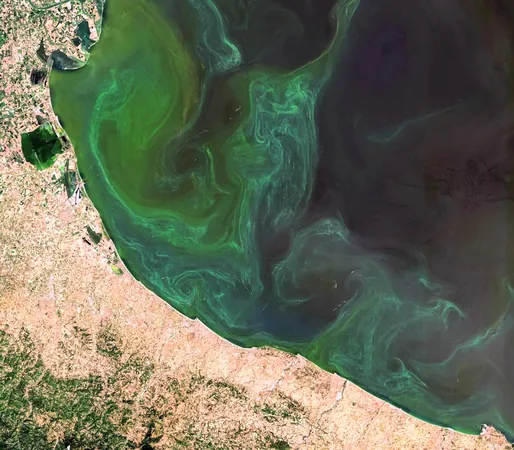
The Hidden Danger: How Marine Heatwaves are Endangering Ocean Health and What You Need to Know
2024-11-02
Author: Yu
In a concerning development for our planet's oceans, marine heatwaves have emerged as a significant threat to the delicate balance of ocean ecosystems, particularly affecting the seemingly insignificant yet critically important phytoplankton—the unsung heroes of the marine food web.
Phytoplankton: The Ocean's Essential Microorganisms
Phytoplankton, though invisible to the naked eye, are microscopic algae that play a vital role in sustaining marine life. Acting as the backbone of the ocean's food web, they produce organic carbon via photosynthesis, which supports a vast array of marine creatures and contributes substantially to regulating Earth's climate. Traditionally, marine ecosystems experience robust phytoplankton blooms in spring, fueled by nutrient-rich waters from deeper ocean layers rising to the surface.
However, alarming new research reveals that these essential blooms are now facing unprecedented challenges.
Marine Heatwaves: A Disruption to Spring Blooms
A recent study from the Institute of Marine Sciences of the National Research Council of Italy (CNR-ISMAR), part of ESA's CAREHeat project, highlights the adverse impacts of marine heatwaves on phytoplankton populations in the North-Western Mediterranean Sea. The prolonged warmer temperatures expected during winter months prevent crucial nutrients from deep waters from surfacing, thereby disrupting the timing and intensity of phytoplankton blooms. This could result in a staggering reduction in carbon biomass, with potential declines of up to 70% during these events.
A Domino Effect Throughout the Marine Ecosystem
Delays in phytoplankton blooms can have severe ripple effects throughout the marine food chain. As noted by co-author Emanuele Organelli, these shifts can create mismatch scenarios where higher food chain species, such as zooplankton and beyond, face food shortages. For fish, seabirds, and marine mammals that depend on these primary producers, the consequences could be dire, leading to altered migration patterns and population declines.
The Technology Behind Tracking
To tackle this pressing issue, scientists turned to advanced technologies and satellite data to monitor marine heatwaves. Using data from ESA's Climate Change Initiative and platforms like the Copernicus Sentinel-3, researchers analyzed temperature changes in the Mediterranean from 2012 to 2022, looking for patterns and spikes in marine heatwaves.
Marie-Helene Rio, an ESA scientist, emphasized the critical importance of continuous satellite monitoring to safeguard marine biodiversity. The increasing frequency of these heatwaves threatens not only key ocean services such as fisheries but also the ocean's capacity to sequester carbon—a key process in combating climate change.
Implications for Coastal Communities and Global Climate
Marine heatwaves don't stop at the microscopic level; they can destroy entire marine ecosystems and disrupt the livelihoods of coastal communities that rely on fishing for sustenance. Reduced fish populations due to phytoplankton decline could result in economic struggles for families dependent on this vital resource.
Moreover, as phytoplankton's ability to absorb carbon diminishes, the risk of accelerated climate change amplifies. Without immediate attention and action, this cycle of disruption could have far-reaching consequences for both marine and terrestrial life.
What Can Be Done?
Monitoring marine heatwaves is just the first step toward preventing a potential domino effect through the oceans. Scientists advocate for stronger protective measures in vulnerable marine areas and development of innovative strategies to mitigate the impacts of climate change.
The plight of phytoplankton serves as a crucial reminder: our oceans need urgent help. By understanding the challenges posed by marine heatwaves, we can take action to protect these vital ecosystems and ensure a stable, healthy future for our planet.
Stay informed about the health of our oceans and join the fight against climate change—our planet's future may depend on it!



 Brasil (PT)
Brasil (PT)
 Canada (EN)
Canada (EN)
 Chile (ES)
Chile (ES)
 Česko (CS)
Česko (CS)
 대한민국 (KO)
대한민국 (KO)
 España (ES)
España (ES)
 France (FR)
France (FR)
 Hong Kong (EN)
Hong Kong (EN)
 Italia (IT)
Italia (IT)
 日本 (JA)
日本 (JA)
 Magyarország (HU)
Magyarország (HU)
 Norge (NO)
Norge (NO)
 Polska (PL)
Polska (PL)
 Schweiz (DE)
Schweiz (DE)
 Singapore (EN)
Singapore (EN)
 Sverige (SV)
Sverige (SV)
 Suomi (FI)
Suomi (FI)
 Türkiye (TR)
Türkiye (TR)
 الإمارات العربية المتحدة (AR)
الإمارات العربية المتحدة (AR)